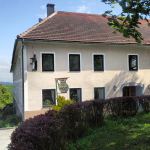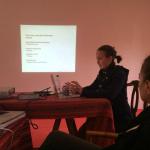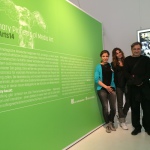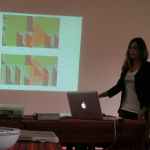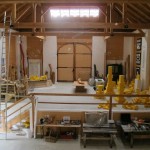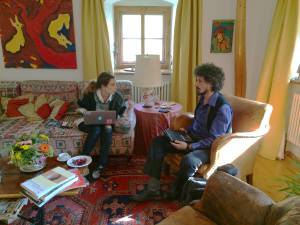
From the Summer Composite Session 2014 in Hochweis-Linz, Austria.
What motivates PhD researchers?
T-Node Phd applicants are generally – but not exclusively – highly talented individuals who have proven their mettle in arts and media, but without the benefit of a formal training. The T-Node PhD is a experience of how to do research and it leads to a certification of knowledge and on high level network.
You will be pushed in contact with a higly recognaised network of world based researcher of aesthetics, technology, arts, sciences, and more.
Whether it is a passion for your subject or a desire to pursue a career, there are as many reasons for doing a PhD as there are PhD researchers. For many T-Node PhD researchers, personal interest in the subject forms the basis of their decision to continue with research and education. Some intend to use the PhD as the basis of a future career, whilst others are keen to take the advantage to continue to learn about something interesting whilst the opportunity is there.
If you have a strong personal interest in the subject of your research, and you are also interested in how to do research you will be put in touch with a highly recognized network of world based researchers in aesthetics, technology, arts, sciences, and more. The T-Node PhD also provides the successful candidate a worldwide recognition of having attained a high standard in scientific and artistic achievement.
Our graduates tend to agree on the personal benefits – a strong sense of achievement, a strong sense of self-confidence, and opportunity to polish skills – that the T-Node PhD qualification brings to them.
A PhD is a grounding for any research career because it teaches how to do research.
If you have a strong personal interest in the subject of your research, and youre also interested in how do a research you hav eto apply a PhD. For Academia a PhD is deemed desiderable. Researchers who have identified these as a potential career options are often aware of perceived ‘glass ceiling’ and undertake PhDs to maximise their potential progression.
Here are some questions to ask when considering whether to do a T-Node PhD:
- Personal motivations: Why do you want to do a PhD? Do you understand the responsibility that research involves? Do you care about cultural growth? Do you invest in your culture and in yourself as highly cultivated researcher? Have you spoken to current PhD students about the reality of research in your field?
- The subject research: Do you want to develop your knowledge of a subject you studied during your undergraduate degree? Have you considered moving to a new subject of research? What work have you read published by other researchers in your field of interest?
- The project: Are you interested in applied research? Do you want to have a link to a partner outside the university? Are you likely to get funding?
- The supervisor: Do you know how often you will meet your supervisor and how they will assess your progress? Are they aware of training and support elsewhere in the institution?
- The institution: T-Node Is there a formal training program that suits your skills and needs ? Does the network hold the reference material you will need? What can you learn from the code of practice or handbook for research students? Is there an active postgraduate research community?
- Your motivations: Are you hoping to remain in academia? Will you have the change to publish your work if it is of sufficient quality? What have former PhD researchers in this field gone on to do?
If you are starting a career in academia you NEED have a PhD. Institutions are competing with each other and having a PhD gives huge credibility as a researcher and as a teacher in all whole world.
Some shots from the Summer Composite Session 2014 at Linz, Austria:
- From 29th August to 7th September the T-Node staff has worked on the Summer Composite Session 2014 at the beautiful H-Studios, in Hochweis-Linz, Austria. Updates by Gianna Angelini, Regina Durig, Hanieh Abbasinik, Francesco Monico and Derrick de Kerckhove.
- From 29th August to 7th September the T-Node staff has worked on the Summer Composite Session 2014 at the beautiful H-Studios, in Hochweis-Linz, Austria. Updates by Gianna Angelini, Regina Durig, Hanieh Abbasinik, Francesco Monico and Derrick de Kerckhove.
- From 29th August to 7th September the T-Node staff has worked on the Summer Composite Session 2014 at the beautiful H-Studios, in Hochweis-Linz, Austria. Updates by Gianna Angelini, Regina Durig, Hanieh Abbasinik, Francesco Monico and Derrick de Kerckhove.
- T-Node researchers and supervisors meet the mass media theorist and Planetary Collegium member Derrick De Kerckhove during the PhD Summer Session 2014 at Linz, Austria.
- T-Node researchers and supervisors meet the mass media theorist and Planetary Collegium member Derrick De Kerckhove during the PhD Summer Session 2014 at Linz, Austria.
- T-Node researchers and supervisors meet the mass media theorist and Planetary Collegium member Derrick De Kerckhove during the PhD Summer Session 2014 at Linz, Austria.
- T-Node staff has worked on the Summer Composite Session 2014 at the beautiful H-Studios, in Hochweis-Linz, Austria.
- A “garden session” for the PhD Summer Session 2014 at Linz.
- The beautiful H-Studios, in Hochweis-Linz, Austria. Here took place the PhD Summer Session 2014.
- From 29th August to 7th September the T-Node staff has worked on the Summer Composite Session 2014 at the beautiful H-Studios, in Hochweis-Linz, Austria. Updates by Gianna Angelini, Regina Durig, Hanieh Abbasinik, Francesco Monico and Derrick de Kerckhove.
- From 29th August to 7th September the T-Node staff has worked on the Summer Composite Session 2014 at the beautiful H-Studios, in Hochweis-Linz, Austria. Updates by Gianna Angelini, Regina Durig, Hanieh Abbasinik, Francesco Monico and Derrick de Kerckhove.
- The beautiful landscape from the H-Studios, in Hochweis-Linz, Austria. Here took place the PhD Summer Session 2014.
- T-Node researchers at the special exhibit dedicated to Roy Ascott @ Ars Electronica 2014
- From 29th August to 7th September the T-Node staff has worked on the Summer Composite Session 2014 at the beautiful H-Studios, in Hochweis-Linz, Austria. Updates by Gianna Angelini, Regina Durig, Hanieh Abbasinik, Francesco Monico and Derrick de Kerckhove.
- From 29th August to 7th September the T-Node staff has worked on the Summer Composite Session 2014 at the beautiful H-Studios, in Hochweis-Linz, Austria. Updates by Gianna Angelini, Regina Durig, Hanieh Abbasinik, Francesco Monico and Derrick de Kerckhove.
- From 29th August to 7th September the T-Node staff has worked on the Summer Composite Session 2014 at the beautiful H-Studios, in Hochweis-Linz, Austria. Updates by Gianna Angelini, Regina Durig, Hanieh Abbasinik, Francesco Monico and Derrick de Kerckhove.
- Derrick De Kerckhove and Roy Ascott with T-Node Researchers @ Ars Electronica 2014






